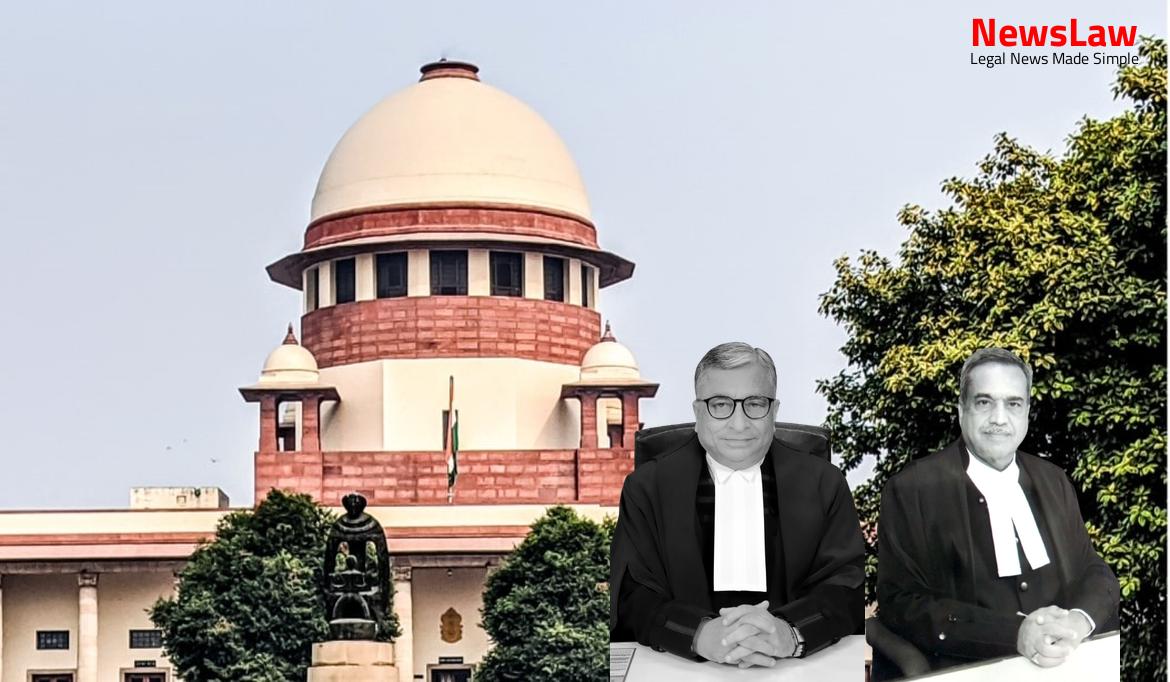Delve into a complex legal case where the High Court scrutinized the jurisdiction and finality of awards in arbitration disputes. The court’s meticulous analysis of prior decisions and the binding nature of arbitration awards sheds light on the legal intricacies involved. Discover how the court’s interpretation of the law shapes the resolution of disputes in the realm of arbitration.
Facts
- The High Court dismissed the review petition stating it did not fall within the review jurisdiction under Order 47 Rule 1, CPC.
- The full Bench of the High Court held that disputes from agreements falling under ‘works contract’ must be adjudicated by the Tribunal under the 1983 Act.
- The contractor failed to complete the work despite repeated extensions, leading to the rescission of the contract by the appellants.
- The respondent-contractor filed a review petition seeking clarification on the jurisdiction of the Arbitral Tribunal due to an earlier order.
- Respondent participated in arbitration proceedings before the Housing Commissioner and filed a modified claim.
- An agreement was executed between the parties in 2005, with the contractor failing to meet the 18-month completion deadline.
- Instead of challenging an arbitrator’s award, the respondent filed a fresh Reference Petition before the Madhya Pradesh Arbitration Tribunal.
- Appellants objected to the fresh claim petition on grounds of the prior award’s resolution and High Court constitution of the Arbitrator.
- Respondent subsequently filed a revision application before the High Court, followed by a claim submission before the Arbitrator-Housing Commissioner.
- The respondent also filed a writ petition with the High Court seeking permission to complete the work, resulting in joint consensus for arbitration in 2008.
Also Read: Legal Analysis on Concurrent Sentences in Drug Trafficking Cases
Issue
- The issue before the court is whether the respondent-contractor was justified in filing a reference before the M.P. Arbitration Tribunal after an award was declared by the Housing Commissioner, who acted as an arbitrator based on the High Court’s order.
- The respondent argues that as the contract was a ‘works contract’, disputes could only be resolved by the Arbitral Tribunal under the 1983 Act, making the award by the Housing Commissioner invalid and without jurisdiction.
- Key points to consider are the reliefs sought by the respondent in Writ Petition No.9131 of 2008, and the claims made before the High Court, the Arbitrator – Housing Commissioner, and the Arbitral Tribunal.
- The Arbitral Tribunal framed preliminary issues regarding compliance with contract provisions and the respondent’s locus standi to file the petition despite the earlier award by the Housing Commissioner.
Also Read: Upholding Professional Standards in Legal Disciplinary Proceedings
Arguments
- The petitioner argues that claims above Rs.50,000 must be brought before the Tribunal under the 1983 Act.
- Disputes cannot be referred to the Arbitration Tribunal without first being decided by the final authority under the ‘works contract’.
- The 1983 Act is considered a Special Act in Madhya Pradesh, prevailing over the Arbitration Act, 1996.
- The petitioner contends that the respondent’s claim was dismissed by the Housing Commissioner earlier and no objection was raised at that time.
- The petitioner argues that the respondent initiated the arbitration proceedings themselves, so they cannot challenge them now.
- The petitioner insists that the High Court’s order holds jurisdiction unless set aside by a competent court.
- A fresh claim petition by the respondent is deemed not maintainable due to Issue Estoppel and prior decisions in similar cases.
- The petitioner highlights that the High Court previously referred the dispute to the Arbitrator upon the respondent’s petition.
- Previous orders and awards had not been challenged by the respondent, implying their validity.
- The High Court’s judgment to revisit the claim petition is challenged by the petitioner as unsustainable in law and fact.
- The respondent’s review petition, filed after a significant delay, was also dismissed by the High Court.
Also Read: Quashing of Criminal Proceedings: Legal Analysis
Analysis
- The High Court has the authority to intervene if it observes certain irregularities in the functioning of the Tribunal.
- These irregularities include exercising a jurisdiction not legally granted, failing to exercise a jurisdiction that is legally granted, illegal actions or material irregularities in jurisdiction, misconduct in proceedings, or a party improperly influencing the award.
- The High Court follows a similar procedure as in civil cases under Section 115 of the Code of Civil Procedure 1908 when deciding on a revision under this section.
- The High Court is required to communicate its decision in the revision to the Tribunal.
- The High Court passed an order referring the dispute between the parties to the Arbitrator – Housing Commissioner with the consent of both parties.
- The respondent-contractor filed a Writ Petition submitting that he invoked the arbitration clause, leading to the appointment of the Housing Commissioner as the Arbitrator.
- The respondent-contractor submitted claims before the Arbitrator, who then issued an award on 07.11.2008.
- The award passed by the Arbitrator-Housing Commissioner was not challenged by the respondent-contractor and has attained finality.
- The High Court’s power of revision under Section 19 of the 1983 Act was discussed, emphasizing the binding nature of the award between the parties.
- The role of the Housing Commissioner as the Arbitrator and the directive to decide the quantified claim were highlighted, showing the finality of the award.
- The respondent-contractor’s actions and the acceptance of payments as ordered by the Arbitrator were noted as indications of agreement and acknowledgment of the award.
- The Hon’ble High Court in the case of Ditya elaborately discussed the matter in para 12
- The court held that even if a decision is wrong and contrary to the law, it remains binding on the parties until set aside in appeal or through other remedies
- Reference is made to the case of Hindustan Zinc Ltd. vs Ajmer Vidyut Vitran Nigam Ltd. (2019) 17 SCC 82
- Subsequent fresh reference petition under the 1983 Act for the same claims as raised before the Arbitrator – Housing Commissioner is not maintainable
- Claims already raised before the Arbitrator would not be reconsidered before the learned Arbitral Tribunal
- Judicial principle against re-litigating same claims in different forums applies
Decision
- The High Court allowed the appeals and quashed the order of the Arbitral Tribunal dated 27.02.2017
- The High Court set aside the impugned judgment and order dated 08.05.2018
- The respondent contractor in Writ Petition No. 9131 of 2008 sought various reliefs related to completing arbitration proceedings and outstanding dues
- The High Court, in its order dated 20.08.2008, noted the invocation of the arbitration clause in the agreement
- The interim order dated 07.08.2008 was to continue until a decision on such application is taken
- The aggrieved party retained the right to approach the Court of law if dissatisfied with the final outcome
- A decision on any further application would be made expeditiously within a week
- The arbitrator, Housing Commissioner of M.P. Housing Board, was to decide the dispute within the agreed period
- No work order was to be issued until the arbitration process was completed
- A decision on the interim prayer was to be made within a week
Case Title: M.P HOUSING AND INFRASTRUCTURE DEVELOPMENT BOARD Vs. K.P. DWIVEDI (2021 INSC 816)
Case Number: C.A. No.-006768-006768 / 2021



